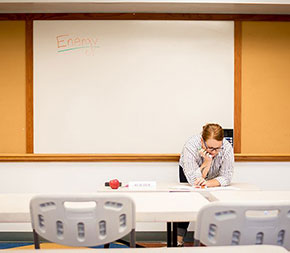How One Special Education Teacher Battles Burnout

by All Star Staff


Roschele Wagoner
Special Education Teacher
Everett, WA
Meet Roschele Wagoner, a black belt in Aikido who uses her martial arts skills every day in the classroom to stay grounded, balanced, and disciplined.
But even for a black belt, the challenges of being a teacher are many. And no teaching job can be as challenging-or rewarding-as being a special education teacher. After being a substitute teacher for three years and a special ed teacher for six, Roschele certainly has had some great days and some that weren’t quite so good. And she will tell you that teacher burnout is often part of the picture, even with her martial arts background. Keep reading to see her suggestions for preventing teacher burnout and stress.
Q: What contributes to burnout for special ed teachers?
A: There are many emotional components involved in teaching special education. Most of my students are physically, emotionally or medically fragile, and I worry what their quality of life will be when they finish school. Their academic and social progress is painfully slow, and is sometimes virtually non-existent. This can add to teacher stress and is a major cause of teacher burnout.
Q: How does your Aikido training help you deal with burnout?
A: First, in the classroom, I try not to fight because that only intensifies the struggle. My Aikido training teaches me to be grounded, breathe and blend with incoming energy.
I remember the core reason that I am a teacher and trust that for six hours a day I provide trust, safety and support for my students to reach their potential. I feel happy knowing that I am doing some good in this world.

Then I go home, take my dog for a hike and do the activities I love: Aikido, spending time with friends, exploring the mountains and forests, listening to music, kayaking, skiing, gardening and riding my bike. I think these out-of-school activities take my mind off the pressures of teaching and help me avoid work-related stress and teacher burnout.
Q: Can you talk about stress management for special ed teachers?
A: It’s essential to have a routine not only for your students but also for your para-educators (teachers’ aides). It can be hard to manage people-adults and kids alike-and routines make it a little easier.
It is also helpful to have a good sense of humor, laugh with your students and bring your unique personality to the classroom. Understand that you have students for only six hours a day. You’ll want to make that time as fun and productive as possible.

Make sure to establish a good rapport and clear boundaries with parents at the start of the year. Then make a concerted effort to connect with your colleagues. They can be one of your best resources because there are always teachers with more experience than you. Learn from their mistakes and listen carefully to their suggestions. Camaraderie with your colleagues can often help you prevent teacher burnout and deal with stress.
Finally, you should always contemplate the consequences of adding new responsibilities to your workload before telling an administrator or another teacher that you’ll take on new tasks.
Q: Any advice for students wanting to teach special ed?
A: Make sure special education is truly your calling. Try to find a preparatory course that is specific to special ed. A special ed endorsement may not be as thorough.
- I feel it is important that a special ed degree program have a strong focus on classroom management and incorporate strategies to manage students with challenging behaviors. Managing students well is the key to having a good day.
- I would advise students to take full advantage of their practicum experiences. Explore many different classrooms to get an idea of what population you would like to teach. I volunteered for agencies that served people with disabilities prior to pursuing my teacher certification. This is a great way to ensure that the field of special ed will be compatible with you, your personality and long-term career goals.
- I’d also recommend that new teachers find a school that has a new-teacher mentor program. You will be assigned a mentor for the entire year to help navigate everything from creating lesson plans to mastering Individualized Education Programs (IEPs) and preventing teacher burnout.
Being a special education teacher is a selfless job and requires an incredible amount of patience. Student progress can be slow and “Aha! moments” are rare. If you don’t have the patience, it would be best to serve a different population of students. If you do decide to become a special ed teacher, I think the strategies above will help you manage stress and avoid teacher burnout.



